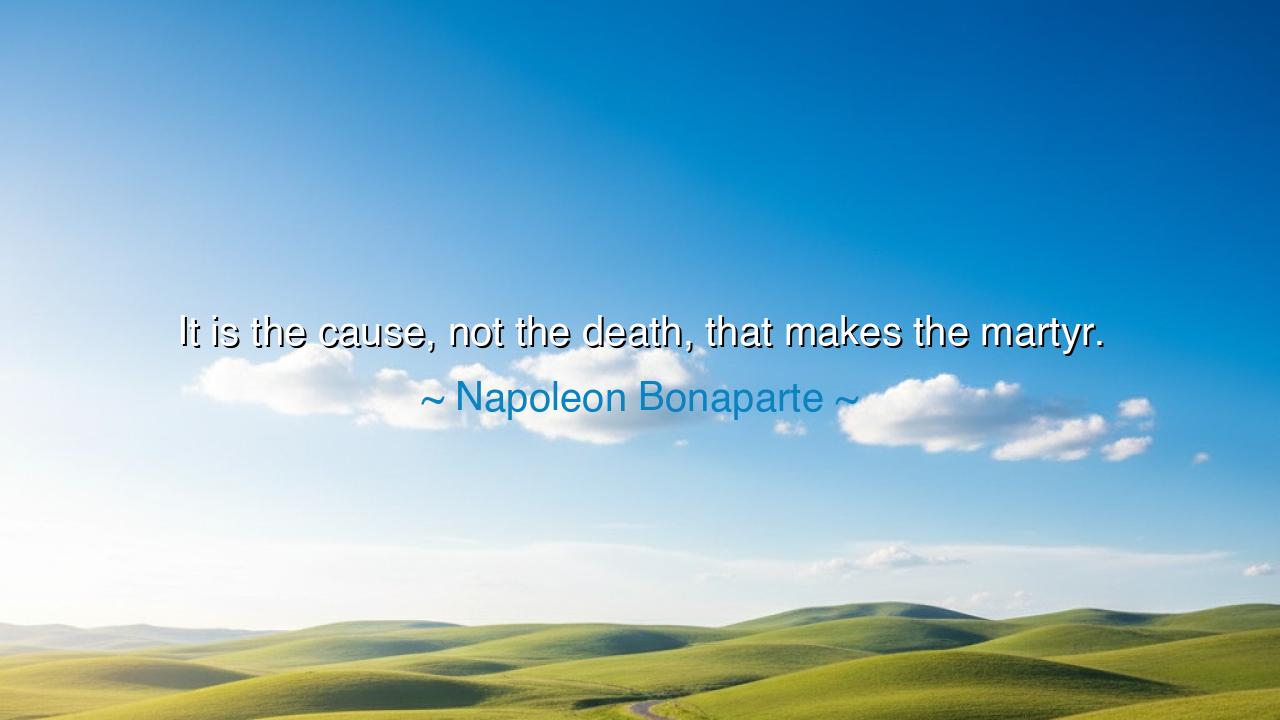
It is the cause, not the death, that makes the martyr.






"It is the cause, not the death, that makes the martyr." Thus spoke Napoleon Bonaparte, the conqueror and philosopher of ambition, whose words cut through the illusions of glory and lay bare the true essence of sacrifice. In this saying lies a profound understanding of history and of the human spirit—a reminder that death alone does not sanctify, that the shedding of blood is meaningless unless it is poured out for a righteous cause. Napoleon, who saw countless men fall in battle, understood that not every fallen soldier becomes a martyr, for it is not the manner of dying that sanctifies the soul, but the purpose for which one dies.
The origin of these words can be traced to the heart of revolution and empire. Napoleon, a man shaped by the chaos of the French Revolution, had witnessed both noble sacrifice and blind slaughter. He saw men die shouting for liberty, and others die in madness, consumed by the very violence they unleashed. In that crucible, he learned that death, by itself, is empty. The true measure of martyrdom lies not in the act of dying, but in the idea that outlives the dying—the belief, the vision, the truth that endures when the body perishes. A cause rooted in justice, in hope, in the upliftment of humanity—such a cause alone transforms death into something immortal.
History, that stern teacher, confirms his wisdom. Consider Joan of Arc, the maiden of France, who perished by fire but lived forever in spirit. She was not a martyr because she died—many perished in her time—but because her death bore witness to something greater: the courage of faith and the unity of a broken nation. Her cause was not her own life, but her people’s freedom. The flame that consumed her body kindled a thousand more in the hearts of her countrymen. Thus, her cause transformed her suffering into meaning, her defeat into victory, her death into immortality.
By contrast, there are countless deaths that history forgets. Armies fall, rulers perish, zealots burn, yet their names are dust. Why? Because their deaths served nothing beyond themselves. They fought not for truth, but for pride; not for freedom, but for dominion. The martyr is not he who dies first, but he who dies for something that lives on. Napoleon, though often called a man of war, saw this clearly. For even as he led his soldiers to battle, he knew that victory alone could not justify bloodshed. “The cause,” he reminds us, “is the soul of sacrifice.” Without it, even the bravest death is but noise upon the wind.
And yet, his words reach beyond the battlefield—they speak to every human heart that struggles, endures, and sacrifices for meaning. In our daily lives, we too face small martyrdoms—the surrender of comfort for truth, of ease for integrity, of silence for justice. To suffer for something noble is to join the eternal lineage of those who lived and died for ideals that outlasted them. For the martyrdom of principle is not confined to death; it is the quiet strength of those who give of themselves for love, for goodness, for the betterment of mankind. The mother who toils unseen for her children, the dissident who speaks truth in chains, the teacher who plants seeds of knowledge in the dark—each lives the spirit of Napoleon’s saying.
But let this truth be known: not every cause is worthy of the name. Napoleon himself understood the peril of false crusades, for he had seen men blinded by ambition, empires rise in pride only to collapse in ruin. The cause that makes the martyr must be one that elevates, not destroys—one rooted in truth, justice, and compassion. To give one’s life for hatred or tyranny is not heroism, but tragedy. The test of a cause is not its power to conquer, but its power to uplift. Only that which serves the good of humanity can sanctify the sacrifice of life.
So, my listener, take this lesson into your soul: seek always the cause before the glory. Do not crave the admiration of the world, but the approval of conscience. If you must sacrifice, let it be for something eternal—for truth, for love, for the freedom of the spirit. Remember that the value of life lies not in its length, but in its purpose. And if the day should come when you are called to stand for what is right, do so not with fear of death, but with the knowledge that only a worthy cause gives meaning to your struggle.
For in the end, as Napoleon Bonaparte declared, it is not the sword, the fire, or the grave that immortalizes a man—it is the cause that outlives him. The body falls, the name fades, but the idea endures, carried forward by those who believe. Let your life, then, be a cause worth dying for, and your death—when it comes—will not be an end, but a victory that time itself cannot erase.






AAdministratorAdministrator
Welcome, honored guests. Please leave a comment, we will respond soon